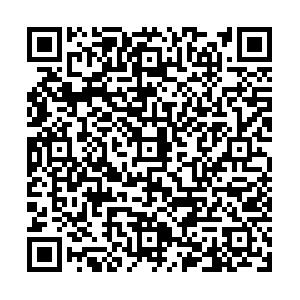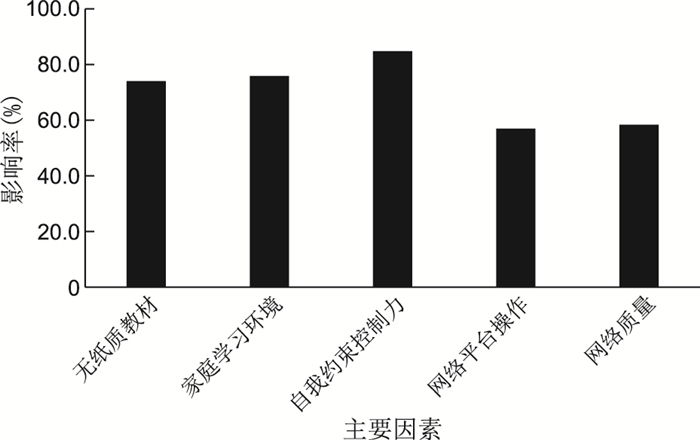Discussion on the effect of online teaching and influencing factors of learning initiative of "Health Statistics"
-
摘要:
目的 2020年,新型冠状病毒肺炎疫情席卷全国,线上教学在各个高校全面铺开,本研究调查陕西中医药大学食品卫生与营养学专业《卫生统计学》课程线上教学开展情况,分析学生学习效果及其影响因素,提出相应对策,为后期开展混合式教学改革及提高学生学业水平提供参考。 方法 采用整群抽样法选择陕西中医药大学2018级食品卫生与营养学专业58名本科生为研究对象,利用自制调查问卷、大学生学习主动性及大学生学业自我效能感量表收集研究对象一般信息、线上教学开展情况、学生学习主动性和学业自我效能等信息。采用SPSS 25.0统计学软件处理数据,学业自我效能感与学习主动性的关系采用简单线性相关分析,学习主动性的影响因素分析采用多元线性回归分析。 结果 58名研究对象中,倾向于完全线上授课21人,占36.2%,线上+线下授课31人,占53.4%,线上教学整体满意度达93.4%,学习效果评价认可度达81.0%;是否独生子女、是否考研、是否认可所学专业及不同性别学生学习主动性差异有统计学意义(均P<0.05);性别、是否考研、对所学专业的认可度及学业自我效能感为学生学习主动性的影响因素(均P<0.05)。 结论 线上教学总体满意度较高,性别、是否考研、对所学专业的认可度及学业自我效能感能够影响学生学习主动性,进而影响学习效果,应采取不同的改革激励措施,以提高学生学习主动性,最终提升学习效果。 Abstract:Objective In 2020, the COVID-19 epidemic has swept across the whole country and online teaching has been fully implemented in various colleges and universities. This study aimed to survey the development of online teaching of the "Health Statistics" course of food hygiene and nutrition in Shaanxi University of Chinese Medicine, analyse the effect of student learning and its influencing factors and propose corresponding countermeasures to provide reference for the later development of mixed teaching reform and improvement of students' academic level. Methods Cluster sampling method was used to select 58 undergraduates majoring in food hygiene and nutrition from Shaanxi University of Chinese Medicine as the research objects. The self-made questionnaire, students' learning initiative and academic self-efficacy scale were used to collect the general information of the research object, the development of online teaching, students' learning initiative and academic self-efficacy. SPSS 25.0 was used to process data. Simple linear correlation analysis was performed to determine the relationship between academic self-efficacy and learning initiative. The influencing factors of learning initiative were analyzed by multiple linear regression analysis. Results Amongst the 58 research subjects, 21 attended completely online teaching, accounting for 36.2%, whilst 31 attended online+offline, accounting for 53.4%. The overall satisfaction of online teaching reached 93.4% and the recognition of learning effect evaluation reached 81.0%. There were significant differences in learning initiative between students of different genders, whether they were the only child or not, whether they took postgraduate entrance examination or not, whether they recognized the major being studied or not (all P < 0.05). Gender, postgraduate entrance examination, recognition of their major being studied and academic self-efficacy were the influencing factors of students' learning initiative (all P < 0.05). Conclusion The overall satisfaction of online teaching is relatively high. Regardless of being an only child, gender, postgraduate entrance examination, recognition of the major being studied and academic self-efficacy could affect students' learning initiative, which, in turn, affects the learning effect. Different reform and incentive measures should be adopted to improve students' learning initiative and ultimately enhance the learning effect. -
Key words:
- Health statistics /
- Online teaching /
- Teaching effect /
- Influencing factors
-
表 1 学生对线上教学效果评价[人(%)]
Table 1. Students' evaluation of the effectiveness of online teaching [cases(%)]
项目 非常满意 满意 一般 不满意 教师授课态度认真负责 27(46.6) 28(48.3) 3(5.1) 0 教师教学设计和教学实施过程 19(32.8) 36(62.1) 3(5.1) 0 授课过程重点突出、讲授熟练 23(39.7) 31(53.5) 4(6.8) 0 师生互动较好 23(39.7) 31(53.5) 4(6.8) 0 线上教学技术掌握较好 18(31.0) 35(60.3) 5(8.7) 0 合计 110(37.9) 161(55.5) 19(6.6) 0 表 2 学生对线上学习效果评价[人(%)]
Table 2. Students' evaluation of the effectiveness of online learning [cases(%)]
项目 非常认同 基本认同 一般 不认同 形式便捷,不受时空限制 19(32.8) 31(53.5) 6(10.3) 2(3.4) 提升学习自主性 16(27.6) 31(53.5) 10(17.2) 1(1.7) 可以反复回看 14(24.2) 33(56.9) 10(17.2) 1(1.7) 师生互动更便捷 13(22.5) 34(58.6) 9(15.5) 2(3.4) 能够达到学习目标 14(24.2) 30(51.7) 10(17.2) 4(6.9) 合计 76(26.2) 159(54.8) 45(15.5) 10(3.5) 表 3 学习主动性的影响因素分析(x ±s, 分)
Table 3. Analysis of the influencing factors of learning initiative(x ±s, points)
项目 类别 学习主动性 t值 P值 性别 男性 43.69±6.62 2.156 0.035 女性 48.06±7.16 是否独生子女 是 43.89±7.07 2.059 0.044 否 48.42±5.44 是否考研 是 45.84±6.89 2.517 0.015 否 40.00±5.33 专业认可度 认可 46.08±6.23 2.197 0.032 不认可 40.43±7.55 是否学生干部 是 47.27±7.95 1.300 0.199 否 44.26±6.69 表 4 学业自我效能感与学习主动性的相关分析结果(r值)
Table 4. Results of correlation analysis between academic self-efficacy and learning initiative(r value)
项目 学业能力效能感 学业行为效能感 学业自我效能感 学习情感性 0.734a 0.710a 0.809a 学习互动性 0.590a 0.457a 0.596a 学习自控性 0.104 0.039 0.592a 学习自觉性 0.501a 0.514a 0.788a 学习主动性 0.669a 0.603a 0.678a 注:aP < 0.05。 表 5 学习主动性影响因素的多元线性回归分析
Table 5. Multiple linear regression analysis of influencing factors of learning initiative
变量 B SE β t值 P值 性别 -4.002 1.794 -0.263 -2.231 0.030 是否独生子女 -0.308 1.983 -0.018 -0.155 0.877 是否考研 -5.289 2.119 -0.300 -2.496 0.016 专业认可度 -5.296 2.491 -0.259 -2.126 0.038 学业自我效能感 0.154 0.067 0.266 2.284 0.026 -
[1] 卢曲琴, 刘勇, 郑辉烈, 等. 案例教学模式在SPSS统计软件实习课教学中的启示[J]. 中国卫生统计, 2020, 37(5): 761-763. https://www.cnki.com.cn/Article/CJFDTOTAL-ZGWT202005033.htmLU Q Q, LIU Y, ZHENG H L, et al. The enlightenment of case teaching mode in the practice teaching of SPSS statistical software[J]. Chinese Journal of Health Statistics, 2020, 37(5): 761-763. https://www.cnki.com.cn/Article/CJFDTOTAL-ZGWT202005033.htm [2] 侯瑞丽, 韦丽琴, 戈娜. 混合型PBL教学法在卫生统计学课程中的应用效果评价[J]. 卫生职业教育, 2020, 38(19): 60-62. https://www.cnki.com.cn/Article/CJFDTOTAL-ZDYX202019030.htmHOU R L, WEI L Q, GE N. Evaluation of the Application Effect of Mixed PBL Teaching Method in the Course of Health Statistics[J]. HEALTH VOCATIONAL EDUCATION, 2020, 38(19): 60-62. https://www.cnki.com.cn/Article/CJFDTOTAL-ZDYX202019030.htm [3] 修良昌, 杜进林, 黄志刚, 等. 基于案例的翻转课堂在卫生统计学实验教学中的应用研究[J]. 现代预防医学, 2020, 47(11): 2103-2106.XIU L C, DU J L, HUANG Z G, et al. Application of case-based flipped classroom teaching method in the experimental teaching of health statistics[J]. Modern Preventive Medicin, 2020, 47(11): 2103-2106. [4] 黄友泉, 谢美华. 大学生学习主动性因子结构探索及现状调查[J]. 高等理科教育, 2013(4): 76-81. doi: 10.3969/j.issn.1000-4076.2013.04.013HUANG Y Q, XIE M H. The exploration on factor structure for undergraduate learning initiative and the status survey[J]. Higher Education of Sciences, 2013(4): 76-81. doi: 10.3969/j.issn.1000-4076.2013.04.013 [5] 李秉瑞, 穆薪坤, 彭保清, 等. 军校学员体能训练应对方式与学业自我效能感、成就动机的关系[J]. 第二军医大学学报, 2021, 42(4): 465-468. https://www.cnki.com.cn/Article/CJFDTOTAL-DEJD202104019.htmLI B R, MU X K, PENG B Q, et al. Relationship of physical training coping style with academic self-efficacy and achievement motivation of students in military universities[J]. Academic Journal of Second Military Medical University, 2021, 42(4): 465-468. https://www.cnki.com.cn/Article/CJFDTOTAL-DEJD202104019.htm [6] 马锐, 高文卫, 王大军. 新冠肺炎期间高职学生病原生物学与免疫学课程网络教学探讨[J]. 现代医药卫生, 2021, 37(9): 1560-1562. doi: 10.3969/j.issn.1009-5519.2021.09.037MA R, GAO W W, WANG D J. Discussion on online teaching of pathogen biology and immunology course for higher vocational students during COVID-19[J]. Journal of Modern Medicine & Health, 2021, 37(9): 1560-1562. doi: 10.3969/j.issn.1009-5519.2021.09.037 [7] 邓阳, 侯海峰, 丁国永, 等. 新冠肺炎疫情背景下流行病学课程线上教学的实践与思考[J]. 中国高等医学教育, 2020(11): 78-79. doi: 10.3969/j.issn.1002-1701.2020.11.039DENG Y, HOU H F, DING G Y, et al. Practice and thinking of online teaching of epidemiology course in the context of COVID-19[J]. China Higher Medical Education, 2020(11): 78-79. doi: 10.3969/j.issn.1002-1701.2020.11.039 [8] 佚名. 疫情下在线教学对"以学生为中心"的教育理念重新认识[EB/OL]. (2020-04-02)[2021-06-05]. http://www.51xueba.cn/details/nid-213992.html.Anonymous. Under the epidemic situation, online teaching has a new understanding of the educational concept of "student-centered"[EB/OL]. (2020-04-02). http://www.51xueba.cn/details/nid-213992.html. [9] 李悔, 刘晨, 王成, 等. 疫情防控期医学生在线教学情况的调研分析[J]. 中国高等医学教育, 2020(11): 40-41. https://www.cnki.com.cn/Article/CJFDTOTAL-ZOGU202011024.htmLI M, LIU C, WANG C, et al. Investigation and analysis of medical students' online learing during epidemic prevention and control[J]. China Higher Medical Education, 2020(11): 40-41. https://www.cnki.com.cn/Article/CJFDTOTAL-ZOGU202011024.htm [10] 赵枫, 韩玮, 关素珍. 疫情防控期间医学生自主学习能力现状及影响因素研究[J]. 中国高等医学教育, 2020(11): 46-47.ZHAO F, HAN W, GUAN S Z. Current situation and influencing factors of self-directed learning ability of medical students during epidemic prevention and control[J]. China Higher Medical Education, 2020(11): 46-47. [11] 张东强. 医学生自主学习能力与自我效能感、学业情绪的关系研究[D]. 太原: 山西医科大学, 2016: 59.ZHANG D Q. Study on the relationship between self-efficacy and academic emotion of medical students' autonomous learning ability[D]. Taiyuan: Shanxi Medical University, 2016: 59. [12] 李花慧, 孙慧敏, 闫梓璇, 等. 佳木斯大学预防医学本科生专业认知情况的调查研究[J]. 科技资讯, 2020, 18(27): 201-203. https://www.cnki.com.cn/Article/CJFDTOTAL-ZXLJ202027081.htmLI H H, SUN H M, YAN Z X, et al. An investigation on the professional cognition of preventive medicine undergraduates at Jiamusi university[J]. Science & Technology Information, 2020, 18(27): 201-203. https://www.cnki.com.cn/Article/CJFDTOTAL-ZXLJ202027081.htm [13] 邹志辉, 李子雄, 罗祥智, 等. 预防医学本科生专业满意度调查分析[J]. 基础医学教育, 2019, 21(11): 923-926. https://www.cnki.com.cn/Article/CJFDTOTAL-SXYD201911027.htmZOU Z H, LI Z X, LUO X Z, et al. Major satisfaction of preventive medicine undergraduates[J]. Basic Medical Education, 2019, 21(11): 923-926. https://www.cnki.com.cn/Article/CJFDTOTAL-SXYD201911027.htm [14] 宋雨卿, 罗增让. 大学生学习倦怠与学习成就归因、学业自我效能感的关系[J]. 中国健康心理学杂志, 2018, 26(1): 124-127. https://www.cnki.com.cn/Article/CJFDTOTAL-JKXL201801034.htmSONG Y Q, LUO Z R. The relationship between learning burnout and education achievement attribution, academic self-efficacy of college students[J]. China Journal of Health Psychology, 2018, 26(1): 124-127. https://www.cnki.com.cn/Article/CJFDTOTAL-JKXL201801034.htm [15] 徐慧文, 张婧仪, 邱爽, 等. 新冠肺炎疫情下大学生网络在线学习力与学业自我效能感的相关性研究[J]. 卫生职业教育, 2021, 39(5): 140-142.XU H W, ZHANG J Y, QIU S, et al. Correlation between online learning ability and academic self-efficacy of college students under COVID-19 epidemic[J]. Health Vocational Education, 2021, 39(5): 140-142. [16] 詹茂光. 大学生自主学习能力与自我效能感的实证分析[J]. 重庆科技学院学报(社会科学版), 2020(3): 105-108. https://www.cnki.com.cn/Article/CJFDTOTAL-CQGY202003026.htmZHAN M G. An empirical analysis of self-learning ability and self-efficacy of college students[J]. Journal of Chongqing University of Science and Technology(social sciences edition), 2020(3): 105-108. https://www.cnki.com.cn/Article/CJFDTOTAL-CQGY202003026.htm [17] ERSAN N, FISEKCIOGLU E, DOLEKOGLU S, et al. Perceived sources and levels of stress, general self-efficacy and coping strategies in clinical dental students[J]. Psychol Health Med, 2017, 22(10): 1175-1185. [18] 肖英杰, 郑琛, 陈茂怀, 等. 医学生家庭背景、学医动机与学业成绩的相关分析[J]. 中华全科医学, 2017, 15(5): 834-837. doi: 10.16766/j.cnki.issn.1674-4152.2017.05.032XIAO Y J, ZHENG C, CHEN M H, et al. Relative analysis on family background, learning motivation and academic performance of medical students[J]. Chinese Journal of General Practice, 2017, 15(5): 834-837. doi: 10.16766/j.cnki.issn.1674-4152.2017.05.032 [19] 韩云峰, 葛杰, 谢志平, 等. 医学院校大学生自主学习状况调查[J]. 中国高等医学教育, 2019(5): 59-60. https://www.cnki.com.cn/Article/CJFDTOTAL-ZOGU201905031.htmHAN Y F, GE J, XIE Z P, et al. Investigation on autonomous learning of medical college students[J]. China Higher Medical Education, 2019(5): 59-60. https://www.cnki.com.cn/Article/CJFDTOTAL-ZOGU201905031.htm [20] 王甦平, 倪阳, 周栋, 等. 医学生压力自我感知状态及影响因素分析[J]. 中华全科医学, 2018, 16(8): 1334-1337, 1378. doi: 10.16766/j.cnki.issn.1674-4152.000366WANG S P, NI Y, ZHOU D, et al. Analysis of medical students mental stress state of self-perception and influencing factors[J]. Chinese Journal of General Practice, 2018, 16(8): 1334-1337, 1378. doi: 10.16766/j.cnki.issn.1674-4152.000366 -





 下载:
下载:


